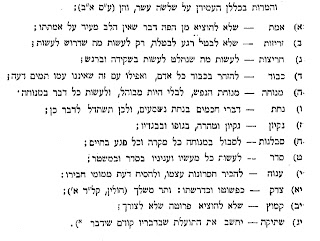 |
| From Mikor Baruch pg 1111 (hebrewbooks.org) |
This Shabbos Kodesh, the 25th of Shvat, is the yahrzeit of Rabbi Yisrael Salanter zt’l. This was prepared in zechus of a refuah shelayma for Reuven ben Tova Chaya and Miriam Orit bas Devorah.
A downloadable pdf version is available here.
Middos of Rabbi
Yisrael Salanter
Do you find time to relax and chill out? The middah of menucha, or tranquility, is an important and overlooked trait. We are all so concerned about staying connected and running from place to place that it’s easy to forget that we need to have a feeling of calmness within us. Rabbi Salanter urges us not to get overwhelmed with life, especially with problems that arise. If I start out with a sense of balance within me, then it’s easier not get overwhelmed and panic stricken. When we feel the pressure of having too much to do, we find it difficult to make decisions. This is why it’s suggested to “always act with deliberation.”
What happens when you don’t follow your GPS directions in order? We all know it is important to follow the correct directions or we’ll get lost. No matter if it’s a school report, project for work, a recipe for dinner, or the way to perform a mitzvah, there’s an order that has to be followed. It’s easy to get frazzled quickly when responsibilities stack up. This is why we have to have to know what needs to be done first. Pirkei Avos (5:7) states that one of the seven characteristics of a wise person is that, “He responds to first things first and to latter things later.” This is a simple, yet practical application of the middah of orderliness.
Do you know anyone that thinks they are always right? According to Rabbi Salanter, the first step in attaining humility is realizing our own strengths and weaknesses. We all excel in certain things and there are other areas that we need to work on. It’s important to remember this when dealing with others. We all need to learn to see the positive things in others. Each time we deal with someone, we need to stop looking at their shortcomings and see the positive things that we can learn from others. By doing this we can grow into the person we are meant to be.
Are justice and righteousness the same thing? Both can only be measured by a set standard. In our lives, that standard is Hashem’s Torah. Doing the right thing isn’t always easy. Rabbi Yisrael Salanter says that we have “to be willing to even give up things that can benefit us. This could include: a parking spot, your seat in shul, the last delicious brownie, giving a smile or a kind work to another person. Rabbi Salanter’s great-grandson, Rabbi Eliyahu Eliezer Dessler zt’l, took this concept of giving and taught that there are two types of people in the world, givers and takers. Being a giver is truly a righteous thing.
שתיקה – יחשוב את התועלת שבדבריו קודם שידבר.



